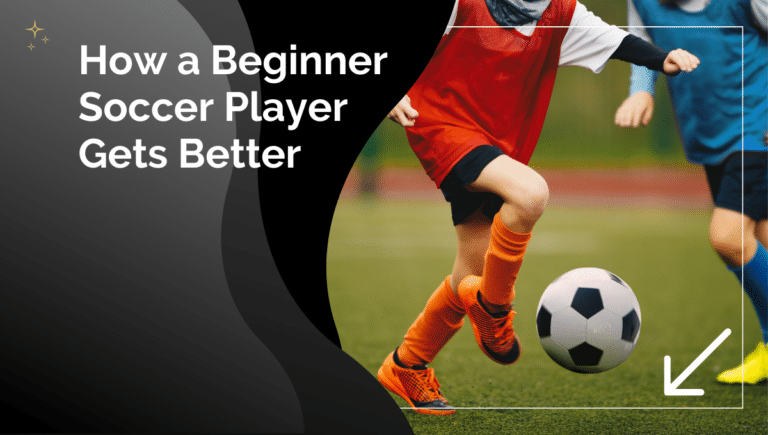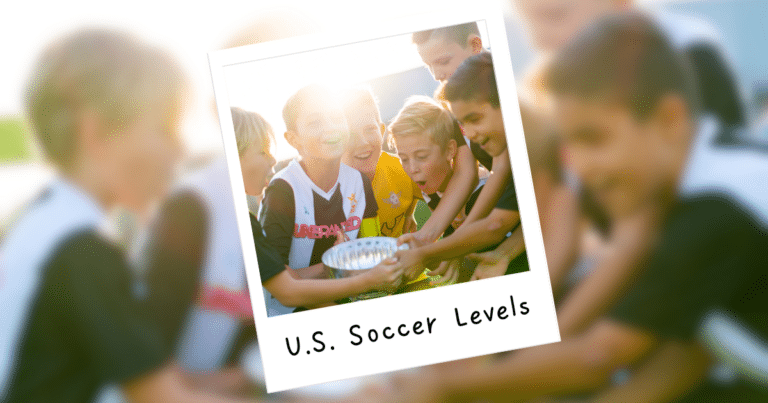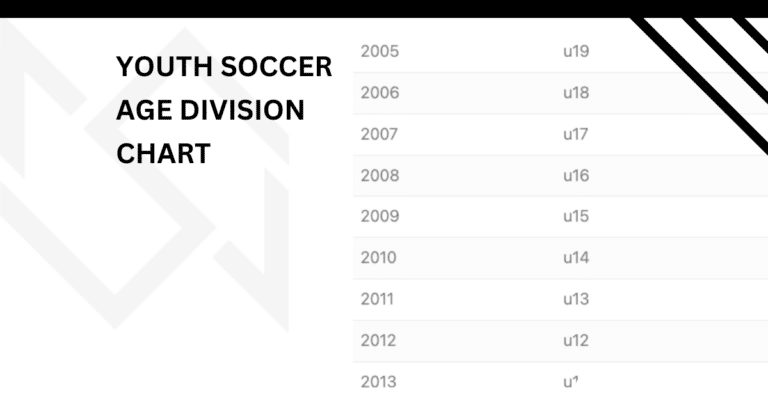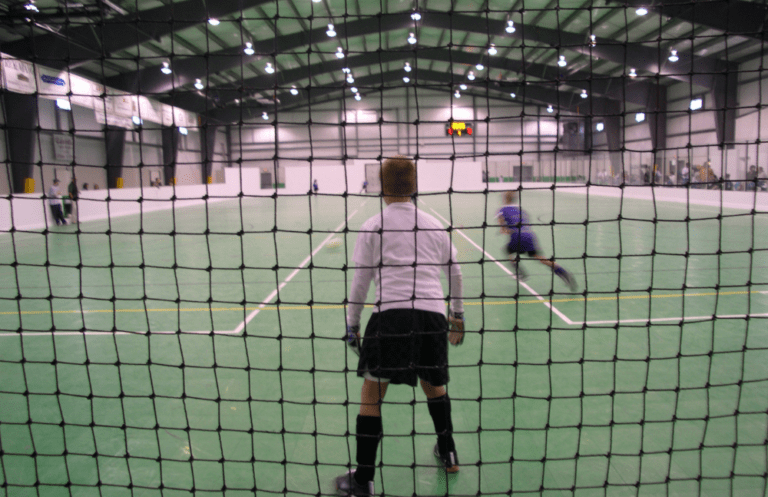Playing Up in Soccer: Should Your Child Do It?
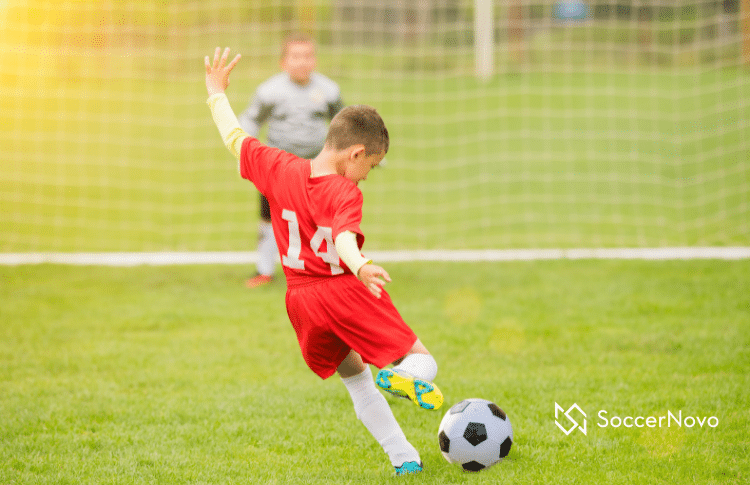
In youth soccer, playing up an age group can feel like a great achievement, but is it worth it? There’s a case for both sides and it really does depend on your child.

Playing up refers to playing on a team with older players than your age group. This can be a controversial topic in the soccer world, with some coaches and parents advocating for it as a way to challenge players and others cautioning against it due to maturity and safety concerns.
Ultimately, whether or not playing up is a good idea for you or your child depends on a variety of factors, including:
- Skill level
- Physical development
- Personal preference
- Team dynamics
The Concept of Playing Up in Soccer
Playing up in soccer refers to allowing young athletes who are highly skilled to compete with and against older players. For example, an 11 year-old soccer player playing up on a U13 team (where most of the kids are 12 and 13 years of age).
This approach is common in youth soccer, where players are grouped by age. The idea behind playing up is to challenge young athletes and promote their athletic and personal development.

However, the potential effects of playing up on youth’s athletic and personal development have not been explored.
Playing up can be beneficial for young athletes in several ways.
- It allows them to compete against more skilled and experienced players, which can help them improve their skills and develop new ones.
- It can help them develop a greater sense of confidence in their abilities, which can translate into better performance on the field.
- Playing up can help young athletes develop a greater sense of teamwork and sportsmanship, as they learn to work together with older players to achieve a common goal.
On the other hand, playing up can also have drawbacks. These cons may include:
- They may find it difficult to keep up with older players, which can lead to frustration and a lack of confidence.
- It can be physically demanding, and young athletes may be more susceptible to injury if they are not properly prepared.
- It can be emotionally challenging, a youth player may feel pressure to perform at a high level and may struggle to balance their academic and athletic responsibilities.
As a parent, I think it’s important to understand where your child is at and ask yourself if they will benefit from playing with more mature players.
Also, I think it’s easier to play up when a player is younger. It is much easier, at age eight, to play with ten-year-olds than it is for a twelve-year-old to play with fourteen-year-olds.
Now, let’s dig into the topic some more…
Benefits of Playing Up in Soccer
Playing up in soccer can be a challenging but rewarding experience. Here are some benefits you may experience when moving up to a higher age group:
Improved Development
Playing against older, more experienced players can help you develop your skills and knowledge of the game. You may be forced to adapt to a faster pace of play, more physical play, and more advanced tactics. This can help you improve your technical ability, decision-making, and overall game sense.
Increased Exposure
Playing up can also increase your exposure to scouts, coaches, and other players. If you perform well against older players, you may catch the eye of a coach or scout who may offer you opportunities to play at a higher level.
This exposure can also help you network with other players and coaches, which can be beneficial for your future in soccer.
Building Confidence
Playing up can be intimidating, but it can also help you build confidence in your abilities. You may surprise yourself by performing well against older players, which can boost your self-esteem and make you feel more confident in your skills.
This confidence can carry over to other areas of your life and help you achieve other goals besides soccer-related ones.
Challenges of Playing Up in Soccer
Playing up against older players can also come with its own challenges.
Physical Challenges
Playing soccer up in age means competing against older and often more physically developed players. This can pose a challenge for younger players who may not yet have the same strength and endurance as their older counterparts.
As a result, younger players may be more prone to injury or fatigue, and may struggle to keep up with the pace of play.
To overcome these physical challenges, it’s important for younger players to focus on building their strength and endurance through regular exercise and conditioning.
Additionally, coaches can help by implementing age-appropriate training programs that gradually increase in intensity over time.
Psychological Challenges
Playing up in soccer can also be mentally challenging for younger players. They may feel intimidated or overwhelmed by the prospect of competing against older players, and may struggle to maintain their confidence and focus during games.
To overcome these psychological challenges, it’s important for players to develop a strong mental game.
If your child is mentally struggling, it is important to have an open dialogue with them. If it comes down to it, let your club know about the challenges they are facing. There may be an opportunity to move them back to their appropriate age group. In this case, I think you need to prioritize your child over the team.
Social Challenges
Playing up in soccer can pose social challenges for younger players. They may feel isolated or excluded from their peers who are playing at their own age level, and may struggle to fit in with older players who have different interests and experiences.
To overcome these social challenges, it’s important for players to find ways to connect with their teammates and build positive relationships. This may involve participating in team-building activities or social events, or simply making an effort to get to know their older teammates on a personal level.
Factors to Consider When Playing Up in Soccer
When considering playing up in soccer, there are several factors that players and coaches should take into account. These factors include the player’s skill level, physical maturity, and mental maturity.
Player’s Skill Level
The player’s skill level is one of the most important factors to consider when playing up in soccer. If a player is not skilled enough to compete at a higher level, they may struggle and become discouraged.
On the other hand, if a player is too skilled for their current level, they may not be challenged enough and may not develop as quickly as they could.
Coaches should assess a player’s skill level objectively and consider their technical abilities, tactical understanding, and physical attributes.
If a player is deemed to be ready to play up, they should be given the opportunity to do so.
Player’s Physical Maturity
Physical maturity is another important factor to consider when playing up in soccer. Players who are physically smaller or weaker than their opponents may struggle to compete at a higher level, especially if the game is more physical.
Conversely, players who are physically more mature than their opponents may have an advantage.
Coaches should consider a player’s height, weight, and strength when deciding whether they are ready to play up.
They should also consider the physical demands of the game at the higher level and whether the player is capable of meeting those demands.
Player’s Mental Maturity
Players who are not emotionally ready to compete at a higher level may struggle with the pressure and expectations that come with playing against older or more experienced opponents.
Conversely, players who are mentally mature may thrive in this environment and develop faster as a result.
Coaches should assess a player’s mental maturity and consider their ability to handle pressure, their level of confidence, and their attitude towards challenges. If a player is mentally mature enough to play up, they should be given the opportunity to do so.
How Coaches Can Support Players Playing Up
As a coach, you may have players who are ready to play up to a higher level. This can be an exciting opportunity for both the player and the team, but it is important to approach it with care and consideration. Here are some ways you can support your players playing up:
Communicate Clearly
Make sure you communicate clearly with the player and their parents about what playing up will entail. Explain the expectations and responsibilities of playing at a higher level, as well as any potential challenges they may face.
Be honest and upfront about what they can expect, and encourage them to ask questions and voice any concerns they may have.
Provide Additional Support
Playing up can be stressful and overwhelming for young players.
As a coach, it is important to provide additional support to help them adjust to their new level of play. This may include extra training sessions, one-on-one coaching, or additional feedback and encouragement.
Encourage Team Support
Playing up can be a great opportunity for the player, but it can also impact the team dynamic.
Encourage your team to support the player and help them feel welcome and included. This can help ease any anxieties the player may have and create a positive team environment.
Monitor Progress
As a coach, it is important to monitor the progress of your player playing up.
Keep track of their performance, both on and off the field, and provide feedback and support as needed. This can help ensure that they continue to develop and grow, and that they are able to handle the challenges of playing at a higher level.
Parental Role in Supporting Players Playing Up
As a parent, support and positive encouragement can go a long way. Playing up can be a great opportunity for your child to improve their skills and challenge themselves, but it can also be a daunting experience. Here are some ways you can support your child:
1. Encourage your child
Playing up can be intimidating, but it is important to encourage your child to embrace the challenge. Let them know that you believe in them and that you are proud of them for taking on this opportunity.
Remind them that mistakes are a natural part of the learning process and that they should not be discouraged by them.
2. Communicate with the coach
It is important to communicate with the coach to ensure that your child is getting the appropriate level of support and guidance.
Find out what the coach’s expectations are and how they plan to help your child adjust to the new level of play. Ask for feedback on your child’s progress and what they can do to improve.
3. Provide extra support
Make sure your child is getting enough rest, proper nutrition, and hydration. Encourage them to stretch and do exercises to prevent injury.
You may also want to consider hiring a personal trainer or coach to provide additional support and training.
4. Manage expectations
It is important to manage your child’s expectations when playing up. Let them know that success may not come immediately and that they may face setbacks along the way.
Emphasize the importance of effort and hard work over winning. Encourage them to set realistic goals and celebrate their achievements, no matter how small.
5. Try to not be a ‘helicopter parent’
As a soccer parent, one of the worst things you can do is to hover around your child. This means that you are watching their every move at practices and games, making sure they get enough playing time, scolding them right after games, talking trash with other parents, etc.
Let them be a kid and play the game they love!
How We Navigated Playing Up
My son Kane played up on a few occasions. He jumped an age group when he was 8, 9, and 11. In each of the seasons, he had a positive experience by the end of the year. But, it wasn’t all sunshine and roses in the middle of the season.
He had to let go of not being the best player on the team which he used as motivation. Because he wasn’t ‘the man’ anymore, he worked extra hard in practices and games.
Kane’s always been on the smaller side but this didn’t affect him that much during those seasons as he was faster than most kids.
With that being said, he’s been playing his age group for the last few seasons. I don’t think he would find the success now that he did when he was younger. During the middle school years, some kids develop much quicker than others. Kids are much bigger, stronger, and faster each year you go up. Eventually, it all evens out but it can take a few more years.
He does, however, train with a group and they are sometimes older than him. This gives him a good balance between his own age group and seeing what’s to come.
If we had to do it over again, he would probably do the same exact thing he did. It was a great experience for the younger age groups to move up. Now that he’s been playing with the same team for three years, they’ve developed great chemistry on and off the field.
Conclusion
Playing up in soccer can be a great way for young players to challenge themselves and improve their skills. It can also provide a pathway for players to advance to higher levels of competition. However, it is important to weigh the benefits and drawbacks before making a decision to play up.
As a parent, I think you’re the final decider of whether your child should play up or not. At the same time, lean on the coach’s recommendations. They may see something you don’t.
I hope that helps! Good luck!
Frequently Asked Questions
What are the advantages of playing up in soccer?
Playing up in soccer allows young players to compete with older, more experienced players. This can help them develop their skills and improve their game. It can also be a great way for players to challenge themselves and push their limits. Additionally, playing up can provide players with opportunities to play with different teammates and coaches, which can broaden their soccer experience.
Is it recommended for young players to play up in soccer?
It depends on the player and their individual circumstances. For some players, playing up can be a great way to improve their game and challenge themselves. However, for others, it may not be the best option. It is important to consider factors such as the player’s age, skill level, physical development, and emotional maturity when deciding whether or not to play up.
What are the risks of playing up in soccer?
Playing up can come with risks, such as increased risk of injury, physical and emotional drain, and burnout. It is important to consider these risks and take steps to mitigate them.

Written By: Beau Bridges
Beau is the founder of SoccerNovo, dedicated to helping players and parents navigate the youth soccer landscape. As a former youth coach and soccer parent, he shares insights on player development, recruiting, and the ever-evolving soccer scene in the U.S.
Let’s connect


